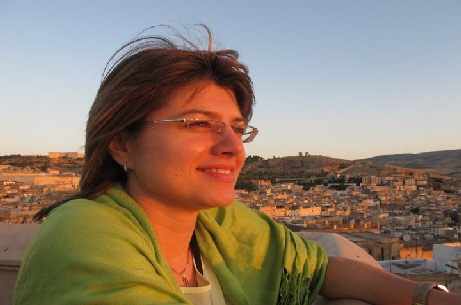
Marina Minic has been involved in a groundbreaking trial on a rare form of hypoglycaemia.
Although no-one in her immediate family is in medicine, Marina Minic [2009] grew up with the desire to help people through science. Her work with researchers at Cambridge on a rare life-threatening form of hypoglycaemia has already brought international headlines in the medical press and she hopes to continue with it to discover new treatments to help patients.
Marina was born and grew up in Podgorica, the capital of Montenegro, where she went to university and also did most of her specialist training. Her mother trained to be an architect but ended up working in newspaper marketing. Her father was an economist in the Ministry of Internal Affairs. Marina has a younger brother who is a lawyer. None of her close family is involved in science, although she says her mother loves medicine and wanted to be a doctor. “When she was growing up she couldn’t go away to study so she had to decide to do something else,” says Marina, “but she had a big influence on my choice of career.”
Another influence was her family doctor who specialised in paediatrics. “He was an inspiration for many doctors in Montenegro because of his knowledge and attitude,” she says. “Just seeing him was like a placebo effect. He was interested in you and had this really calming effect on patients and children. He would listen and explain things and had a really good knowledge of things. You knew you were in safe hands.”
While she was growing up the Balkan war was going on. “War was all around us,” she says, adding that her school filled up with children who had been displaced because of the fighting. She says she has always been an optimistic person, however. “I have always thought it is important to learn from the mistakes of the past and look forward to a better future. For this reason, the idea of becoming a doctor who could help people appealed to me.”
During her second year at the University of Montenegro studying medicine she attended a lecture on endocrinology which she says she was immediately drawn to. “Hormones are involved in so many different systems which was why endocrinology appealed to me,” she says. She describes her endocrinology supervisor as having a huge impact on her clinical development.
Marina graduated in 2003 and then did one year of supervised obligatory training then she worked as a junior doctor in the emergency department. From 2006 to 2010 she was doing her residency in hospitals in Montenegro and Serbia and was attached to the Department of Endocrinology. She also did some teaching at the University of Montenegro and began a part-time masters in endocrinology at the University of Novi Sad.
She moved to Belgrade to finish her specialist training at the University of Belgrade in 2010. In 2003 she applied to Cambridge after having spent a month in Cambridge in 1999 studying English and having been in contact with a specialist in metabolic and endocrine disease at Cambridge who had collaborated with one of her teachers. She had won a national scholarship which initially was to reward her for her hard work, but later included a financial element to enable her to study abroad. However, this fell through when Serbia and Montenegro split and she had to seek alternative funding.
She applied for the British Scholarship Trust in November 2007 to spend a few months in the lab of the Institute of Metabolic Science at Cambridge doing some research for her master’s degree. During that time she was mentored by her current supervisor Dr Robert Semple. She says: “It was a wonderful educational experience where I learned a lot about the challenges, frustrations and opportunities of laboratory science. At the end of my stay I presented the results of my work at one of the Institute’s laboratory meetings, at the same time, taking the chance also to show a few slides illustrating the history, culture and the beautiful landscapes and fauna of Montenegro. In a way I felt like a true ambassador for my country, and left highly motivated to return for a period of formal research training.”
Marina applied twice to Gates Cambridge before being accepted in 2009 to do a PhD in Clinical Biochemistry. When she arrived at Cambridge she became involved in a big clinical collaboration with the Wellcome Trust Sanger Institute, working on cellular and functional analysis in patients with a rare life-threatening form of hypoglycaemia. The project aimed to understand the genetic defect, present in an estimated 1 in 100,000 births, which causes severe hypoglycaemia without detectable insulin being in the bloodstream.
One of the effects of the mutated gene which is little understood is overgrowth of one part of the body which Marina says the team will be investigating in the future. Up to now she has been looking at the effect the mutated gene had on different tissues, especially adipose, muscle and liver tissue, and how this impacts on the metabolism of glucose and lipids.
The work led to a recent breakthrough which received widespread publicity in the scientific media. “We think the mutated gene produces an insulin-like effect, making it seem as if there has been insulin stimulation even though the patient has very low insulin,” says Marina.
She hopes that this will result in new treatments being made available for patients. The mainstay of current treatment has been implantation of a surgical feeding tube through the front of the stomach to allow feeding during sleep. This prevents patients’ blood glucose from dropping dangerously low overnight when monitoring is difficult and when symptoms often pass unnoticed.
Marina hopes to continue her research, but to combine this with her work as an endocrinologist. “I want to work somewhere where I can be both a doctor and a researcher,” she says.












